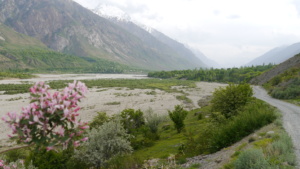 According to the classification of the Food and Agriculture Organisation (FAO) of the United Nations, Central Asian states do not have abundant forest resources. Unfavorable economic conditions and population growth are the main causes of intensive logging of existing forests. The lack of a coherent mechanism of modern management practices also contributes to the degradation of forest areas. Together, these factors worsen the living conditions of people and animals, and the stability of regional ecosystems. Therefore, particularly in today’s context of climate change, comprehensive conservation and sustainable use of forest resources are crucial.
According to the classification of the Food and Agriculture Organisation (FAO) of the United Nations, Central Asian states do not have abundant forest resources. Unfavorable economic conditions and population growth are the main causes of intensive logging of existing forests. The lack of a coherent mechanism of modern management practices also contributes to the degradation of forest areas. Together, these factors worsen the living conditions of people and animals, and the stability of regional ecosystems. Therefore, particularly in today’s context of climate change, comprehensive conservation and sustainable use of forest resources are crucial.
We aim to support our governmental and local partners in all five Central Asian countries to modify laws and regulations, and to reform relevant public agencies and other organizations working in the forestry sector.
The principles of sustainable development, which promote both ecological stability and the generation of long-term socially equitable economic benefit, guide our work.
Our experts support the testing of new management approaches at the local level, and dissemination of results to the national level. Best experience are available to administrative bodies and governmental agencies through regional knowledge exchange. New methods for sustainable forest use tailored to local needs are being developed together with the population and local authorities. At the national level, we assist our partner line ministries in adapting new methods and supporting reforms that facilitate their implementation.
Together with the State Forestry Agency, we aim to strengthen the capacity of forest enterprises (leskhozes) and support forest users to rehabilitate, preserve and sustainably use forests. Our work builds on successful experiences with Joint Forest Management (JFM) in the Pamir region. The main idea of JFM is to provide long- term leases of degraded forest sites that belong to the state forest fund to local households. Tenants rehabilitate and use the forest plot based on management plans and share the agreed amount of their income with the local leskhozes.
In Tajikistan, a climate-sensitive landscape approach is used in forest management. Joint forest management helps to adapt climate change and resolve conflicts between forest and pasture users who both use forests. Women also participate in the forest management process. Training in the JFM approach encourages them to enter into long-term contracts. Integrated land-use measures have been incorporated into management plans and annual plans to ensure sustainable management of forest plots. Elements of the Tajik experience are currently being introduced into the forestry sector reform in Kyrgyzstan.
At the regional level, we strive to promote the exchange of knowledge and experience between countries. Through field visits, representatives of the forestry sector of Kazakhstan, Kyrgyzstan, Tajikistan and Uzbekistan establish mutual cooperation and get acquainted with the testing and implementation of new approaches in local contexts.